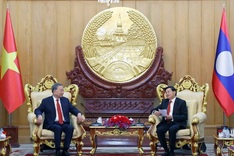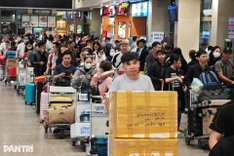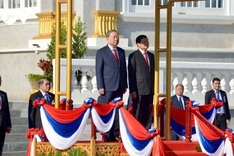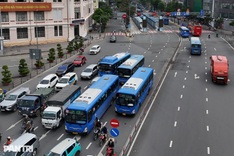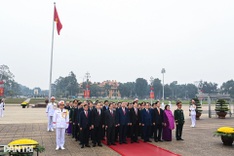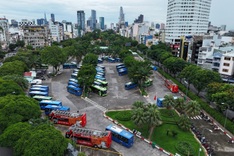>> NA committee proposes ending petroleum stabilisation fund
The State Audit of Vietnam released a report yesterday concluding that the petroleum price stabilisation fund – used by petrol distributors to offset losses due to market price fluctuation – has passed an audit with flying colours.
 |
| Workers manipulate petrol pipes for supplies at PV Oil Nam Dinh in Nam Dinh Province. The State Audit reports that 10 businesses draw a total of VND5.5 trillion (USD267 billion) from the petrol price stabilisation fund over the two-year period. — VNA/VNS Photo Ha Thai |
During 2009-10, the fund was strictly and properly administered by the State, the report concluded.
The amounts drawn from the fund by petroleum distributors matched those allotted by the Government, the report said, concluding that the lack of specific guidelines on the use of the fund was the only source of discrepencies between the fund as audited and earlier reports from businesses.
The audit was conducted on 10 agencies and State-invested enterprises, including the Ministry of Finance, the Ministry of Industry and Trade, and petrol distributors like Petrolimex, PetroVietnam Petroleum (PV Oil), Petec Trading and Investment Co, HCM City Petroleum Ltd Co, Dong Thap Petroleum Trading Co, Petroleum Aviation Co, Military Petroleum Co, Mekong Petroleum Co, Seaway Petroleum Trading Co and Thanh Le Import-Export Co.
Figures released in the report showed that the 10 businesses drew a total of VND5.5 trillion (USD267 billion) from the fund over the two-year period under review.
However, the State Audit said shortcomings in administering and using the fund had confused enterprises, and fluctuations in foreign exchange and lending interest rates had not been taken into account, creating discrepencies in initial reports on the use of the fund.
Some businesses who suffered losses had used their own capitals for the fund, causing a cost increase that put more pressure on the businesses.
The State Audit concluded that the 10 audited enterprises had abided with fund regulations, except for Petroleum Aviation Co, which had failed to make regular reports.
The fund was vulnerable to risks, auditors concluded, as fund proceeds were not managed separately from profits and losses relating to trading activities. While the fund was intended to stabilise fuel prices, it was utilised separate from the State budget and, due to a lack of transparency, could be misused for other purposes.
Auditors said, however, that the fund remained an effective measure to control prices and was a model that had been successfully applied in a number of countries around the world to control inflation and stabilise the economy. Auditors said the fund was able to help businesses quickly response to the global market and reduce administrative procedures, while the public had benefited from lower petrol prices compared to other countries in the region.
The State Audit asked the audited businesses to adjust their accounting procedures and report their financial situations to the Government while strictly adhering to regulations.
Figures released by the Ministry of Industry and Trade showed the price stabilisation fund\'s balance as of September 23 was VND852 billion (USD40.6 million). The petroleum stabilisation fund was established in 2009, and petroleum dealers were required to collect VND300-VND500 per litre of petrol to contribute to the fund.

